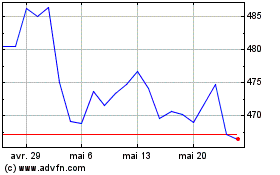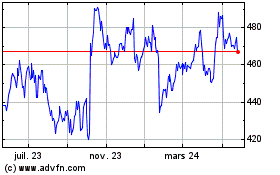Boeing Bows Out Of Bidding for Pentagon Contract -- WSJ
26 Juillet 2019 - 9:02AM
Dow Jones News
By Doug Cameron
This article is being republished as part of our daily
reproduction of WSJ.com articles that also appeared in the U.S.
print edition of The Wall Street Journal (July 26, 2019).
Boeing Co. said it won't bid for a huge Pentagon contract to
replace the nation's land-based nuclear missiles, just a day after
Chief Executive Dennis Muilenburg touted the aerospace giant's
suitability for the job.
The move would leave Northrop Grumman Corp. as the sole bidder
for the first phase of the $60 billion Ground Based Strategic
Deterrent program, even as defense officials and lawmakers express
concern about reduced competition for weapons programs.
Boeing had said winning the contract was a priority but also
expressed concerns about its terms. Boeing executives have said the
huge program would become a "cost shoot-out" between contractors
that would focus on price instead of technical capabilities.
Some analysts said the mounting financial cost to Boeing of the
grounding of its 737 MAX aircraft was undermining its ability to
pursue big military projects. The company has so far disclosed
about $7 billion in additional costs and compensation to cover the
crisis enveloping the MAX since global regulators grounded the
plane in March following the second of two fatal crashes in less
than six months.
Shares in Boeing fell 3.7% to $348.09 on Thursday. Shares in
Northrop Grumman gained 3.4% to $354.72.
In a letter to Air Force acquisition chief Will Roper dated July
23 and reviewed by The Wall Street Journal, Boeing said it believes
Northrop Grumman had an unfair advantage to win the contract
because of its control of the country's main producer of rocket
motors, secured through its acquisition of Orbital ATK Inc. in
2018.
"After numerous attempts to resolve concerns within the
procurement process, Boeing has informed the Air Force that it will
not bid," the company said in a statement.
Mr. Muilenburg on Wednesday told analysts and reporters on an
earnings call that the contract was a big opportunity for
Boeing.
"We are focused on leveraging our work to date on GBSD to
deliver this essential national security capability," he said after
Boeing reported its biggest-ever quarterly loss. Boeing also said
it could slow or stall production of the MAX if it doesn't return
to commercial service by late this year. Boeing was the only big
defense company to report a drop in its military order backlog
during the June quarter.
The Pentagon said last week that the initial GBSD contract, due
to be awarded next year and valued by analysts at $25 billion,
would be given to the company that provides "the best overall
value."
Boeing hasn't ruled out bidding for GBSD if the contract terms
are changed, though its relations with the Air Force -- which is
running the GBSD program -- are complicated by its performance in
producing new refuelling tankers.
The first of those tankers arrived in January, more than a year
late. The Air Force said this week it was withholding $360 million
in payments because of performance issues, including debris found
on new jets. Mr. Roper has been critical of Boeing's work on the
project.
Boeing's defense arm had been on a roll, last year winning three
big Pentagon projects including an Air Force training jet and
helicopter and a Navy drone.
Northrop Grumman said in a statement that it is committed to
supporting the U.S. Air Force and the GBSD program.
Write to Doug Cameron at doug.cameron@wsj.com
(END) Dow Jones Newswires
July 26, 2019 02:47 ET (06:47 GMT)
Copyright (c) 2019 Dow Jones & Company, Inc.
Northrop Grumman (NYSE:NOC)
Graphique Historique de l'Action
De Juin 2024 à Juil 2024

Northrop Grumman (NYSE:NOC)
Graphique Historique de l'Action
De Juil 2023 à Juil 2024
